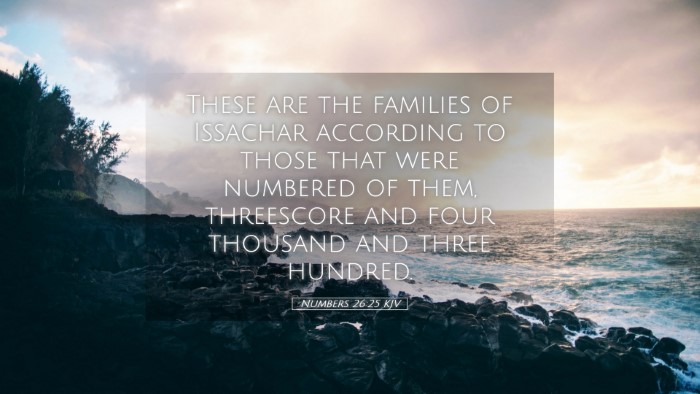Commentary on Numbers 26:25
Verse Context: Numbers 26:25 states, “This was the numbering of the children of Dan after their families: of Shuham, the family of the Shuhamites: these are the families of Dan.” This verse is part of a larger census among the Israelites, which serves various theological and administrative purposes.
Historical and Theological Significance
Throughout the Book of Numbers, significant themes emerge, including the organization of the tribes of Israel, their roles, and God's faithfulness to His promise to Abraham, Isaac, and Jacob. The mentioning of the tribe of Dan is critical both in terms of historical lineage and prophetic implications.
Insights from Matthew Henry
Matthew Henry emphasizes that the mention of the tribe of Dan and its families serves to remind the Israelites of their origins and divine selection. He highlights how each tribe, represented by its families, plays a role in the larger narrative of Israel's history. Henry points out that the Shuhamites, through their lineage, provide a sense of identity and belonging, which is essential for the community of Israel as they prepare to enter the Promised Land.
Insights from Albert Barnes
Albert Barnes provides further commentary on the sociopolitical implications of the census. He observes that the census was not merely a numerical tally but served to reinforce God’s promise to give each tribe its inheritance in the land of Canaan. Barnes notes that the tribe of Dan is significant because, during this time, it begins to take on a role as a border tribe, which affects future conflicts and territorial claims. He highlights that this early establishment of tribal identities was crucial for the political and spiritual formation of Israel.
Insights from Adam Clarke
Adam Clarke offers a linguistic and etymological approach to the text. He examines the name "Dan," which means "Judge," and reflects on its implications for the tribe's future role among the Israelites. Clarke delves into the characteristics of the families within Dan, particularly the Shuhamites, and draws attention to the unique place Dan holds among the tribes as one that is often associated with both strength and vulnerability. Clarke also draws parallels between the census and God's providential guidance of His people, emphasizing the continuity of God's plan through generations.
Key Themes and Lessons
- Identity in God: The families of Dan exemplify how God uses lineage and family structures to fulfill His divine purposes.
- Divine Promise: The census serves as a tangible reminder of God's covenant with Israel, affirming that each tribe has a unique place and purpose in God's plan.
- Preparation for Inheritance: Understanding the structure and number of families prepares the Israelites for their inheritance, instilling hope and anticipation as they approach the Promised Land.
- Applications for Today: Modern readers can find encouragement in knowing that God cares about the details of their lives and identities, just as He did for the tribes of Israel.
Conclusion
The examination of Numbers 26:25 through the lenses of Matthew Henry, Albert Barnes, and Adam Clarke provides rich insights into its historical, theological, and practical implications. Each commentator offers a unique perspective, resultantly painting a comprehensive picture of the significance of the tribe of Dan at this juncture in Israel's history. Such understanding emphasizes the profound connection between our identities, our past, and our relationship with God, which remains relevant for pastors, scholars, and students of the Bible today.


